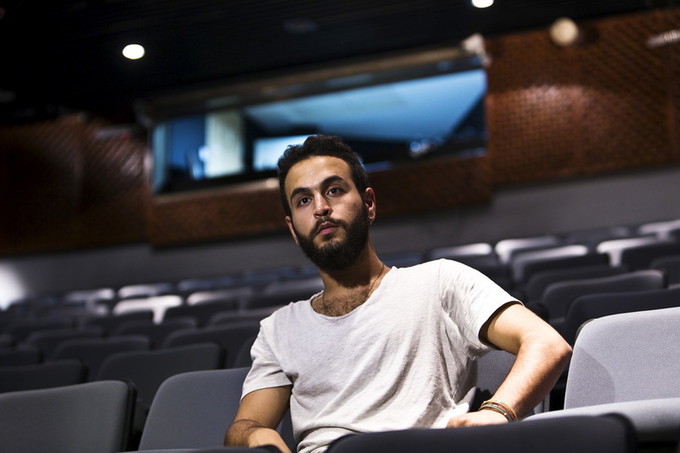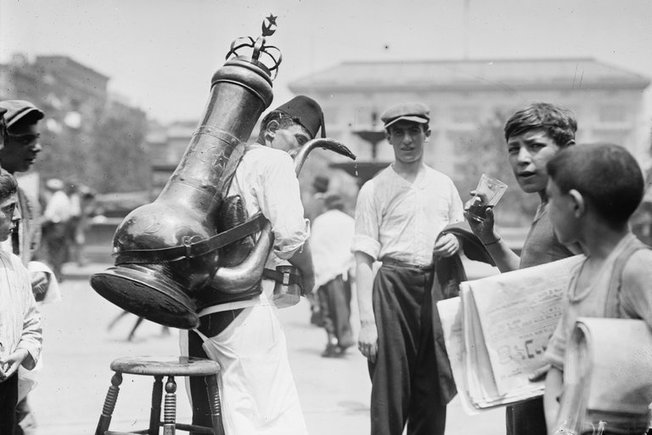
Alia Al Ghussain
The Electronic Intifada
Israel froze funding to Al-Midan Theater after it staged A Parallel Time by Bashar Murkus last year. Nir Elias Reuters
The Palestinian community in Haifa enjoyed a small victory in March when a theater successfully challenged the Israeli government to win reinstatement of official funding cut after controversy over the staging of a play about prisoners last year.
But the reinstatement also threw into focus the constraints on Palestinian artistic expression in present-day Israel and some saw the resumption of official funding as a double-edged sword.
On 29 March, al-Midan Theater reached agreement with the Israeli culture ministry to resume the transfer of public funds to the theater, as well as to unfreeze outstanding funding for last year, ending a stand-off that started in May 2015.
The ministry had frozen al-Midan’s public funding after the theater staged Bashar Murkus’ play A Parallel Time, which revolves around the lives of six Palestinian prisoners and a jailer in an Israeli prison.
Adalah, a Haifa-based legal center, alleged that the ministry’s decision was taken for “political reasons.”
Acting on behalf of al-Midan, Adalah filed a petition against the decision in October 2015.
The legal grounding for the ministry’s decision was dubious from the outset, according to Adalah. The group argued that the decision was illegal and “did not meet the basic requirements of administrative law.” No hearing was held before the decision was made, no formal reasoning was provided for the decision and it did not have any proper factual basis, the legal center said.
In addition, the play had been approved three times by official bodies, including a committee supported by the culture and education ministries, and Adalah lamented the fact that it took the intervention of Israel’s attorney general for the issue to be resolved.
A necessary compromise
“It is unfortunate that it was only after the intervention of the attorney general that the ministry of culture retracted its illegal freezing of funds and its attack on the theater’s freedom of expression and artistic creativity,” Adalah stated after agreement was reached.
“The most important thing for us is that the agreement made between the theater and the ministry did not impose any prohibition or conditioning of the creative content produced by the theater,” Adalah added.
The agreement did, however, entail a compromise under which al-Midan agreed to a deduction of 75,000 shekels (just under $20,000) from its annual budgets between 2016 and 2019. And Palestinian artists in Haifa remain acutely aware that their artistic expression is curtailed by the Israeli state.
“The tightening of democratic spaces in any state is usually reflected in its control and censorship of art. When a state begins censoring art, we know we’ve reached a dangerous situation,” Khulud Khamis, a Haifa-based author, told The Electronic Intifada.
Some artists feel that the reinstatement of funding to al-Midan was simply an attempt to polish Israel’s democratic credentials in the international arena.
“Personally, I was not impressed by the reinstatement of funding,” said Yazid Sadi, al-Midan’s production director. He was speaking to The Electronic Intifada in a personal capacity and was not stating the theater’s position.
“I expected it, as the culture ministry needs from one side to show how democratic they are, but from the other side they made us pay a penalty of 300,000 shekels … So that we think twice next time before we want to stage A Parallel Time or any other meaningful political theater or art.”
Sadi described the compromise al-Midan made as necessary to maintain its freedom of programming: “If we had given into their pressure and cancelled A Parallel Time, we probably wouldn’t have had to pay the penalty. But we didn’t think twice and decided to pay the penalty gladly. The play became a symbol of freedom of expression, and we were ready to give up all of our funding if they would rob us of this very basic right.”
Shrinking freedoms
“A state that censors art is a state that is well aware of the power of art as a tool for political resistance,” Khamis said. “Art has the power to convey reality in different forms and shed light on socio-political phenomena from perspectives that the state does not want us to see, thus acting as an eye-opener.”
While Israeli law is supposed to provide for freedom of speech, Palestinian citizens, who make up one-fifth of Israel’s population, often see these rights violated. In 2003, for instance, the Israeli film board banned the commercial viewing of a film about Israel’s 2002 siege of Jenin refugee camp in the occupied West Bank. The film, Jenin, Jenin, which comprises a collection of interviews with camp residents a week after the invasion, was directed by Mohammed Bakri, a Palestinian citizen of Israel.
The ban was later overturned, although the judge in the case commented that the accusations of war crimes by Israeli forces made in the film were “lies,” and that the documentary had “not been made in good faith.”
Like A Parallel Time, Jenin, Jenin sheds light on the ugly face of Israel’s occupation.
More recently, in 2015, the Israeli high court upheld key provisions of a law imposing legal consequences for those boycotting or advocating a boycott of Israel.
This law will disproportionately affect Palestinian citizens of Israel, who are already marginalized under Israeli law.
A 2011 measure — that Palestinians call the Nakba Law — prevents commemoration of the ethnic cleansing that led to Israel’s creation, for example. Such laws severely restrict the ability of Palestinians in Israel to express their opinions and draw attention to Israel’s crimes, historic and contemporary.
“The problem is that everything is linked to loyalty … You only have the space they will allow you,” said Nadim Nashif, director of Baladna, a Palestinian youth group in Israel.
A “loyalty in culture” bill proposed by Miri Regev, Israel’s culture minister, is currently making its way through Israel’s parliament, the Knesset. The bill would cut funding to any institution that questions the existence of Israel as a “Jewish and democratic state,” denigrates state symbols like the flag and marks the Nakba. An amended version of the first draft was approved by Avichai Mendelblit, Isarael’s attorney general, in February.
“The aim is to make Palestinian cultural institutions behave,” said Nashif.
Maintaining an ethnocracy
The definition of Israel as a Jewish state results in the repression of Palestinian identity and freedom of expression, Nashif added.
“The whole structure of the state is designed to create and educate generations of ‘good’ Arabs, including in the cultural field — Arabs who don’t question government policy, who do not talk about the Nakba,” Nashif said.
Sadi agreed: “The so-called Jewish democracy is ridiculous as it can’t be a real democracy since it is only for Jews.”
This partly explains why Palestinian artists in Israel are disproportionately targeted for censorship. A new generation is exploring and expressing its Palestinian identity, openly questioning the Israeli institutions which discriminate against its community.
“Palestinian artists are usually not funded, or they are not hired,” said Nashif. “Now the discrimination is more extreme and much more evident. The policies of Miri Regev were there before, but done more quietly. There was a concern about image. This government is arrogant enough to say it out loud. These fights have always been there but now they are more open and brutal.”
Source: electronicintifada.net





